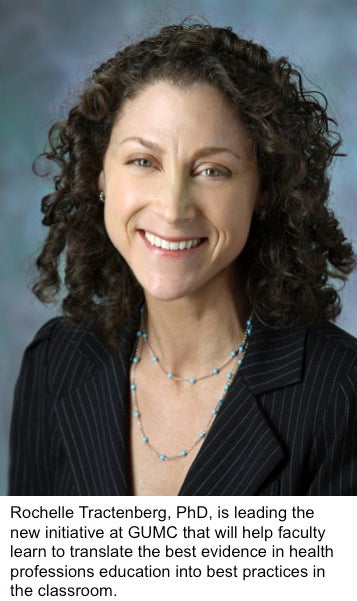International Collaboration Promotes Culture of Evidence in Teaching

Posted in GUMC Stories
 APRIL 24, 2014—Creating a culture of evidence-informed teaching—in which faculty learn to translate the best evidence in health professions education into best practices in the classroom—is the goal of a new initiative that is getting underway at Georgetown University Medical Center (GUMC).
APRIL 24, 2014—Creating a culture of evidence-informed teaching—in which faculty learn to translate the best evidence in health professions education into best practices in the classroom—is the goal of a new initiative that is getting underway at Georgetown University Medical Center (GUMC).
GUMC recently was accepted as a member of the Best Evidence Medical Education (BEME) Collaboration, an international group of 16 universities working to foster evidence-informed education in the medical and health professions. The BEME Collaboration is an initiative of the Association for Medical Education in Europe.
The new BEME International Collaborating Center (BICC), as member institutions are known, will leverage the work of the Center for Innovation in Leadership and Education (CENTILE) at GUMC.
“Establishing a BICC within CENTILE directly advances our mission to support best practices in teaching and educational scholarship,” says CENTILE Director Aviad Haramati, PhD, also a professor of biochemistry and molecular & cellular biology.
The BICC will offer training for faculty in conducting systematic reviews in health professions education, Haramati says.
“Moreover, it will create opportunities to collaborate with other BICCs and scholars around the world to translate those findings into evidence-informed teaching that advances the field of health professions education in truly innovative ways,” he adds.
HARNESSING THE POWER OF EVIDENCE
The BICC will be led by Rochelle Tractenberg, PhD, associate professor in the departments of neurology, psychiatry, and biostatistics, bioinformatics and biomathematics, and director of the Collaborative for Research on Outcomes and -Metrics.
Beyond professional development, Tractenberg says the BICC will expose faculty to the best evidence in health professions education by cultivating strategic external partnerships. For example, the BICC will leverage GUMC’s existing partnership with the Samueli Institute, a nonprofit research organization based in Alexandria, Virginia that brings expertise in conducting systematic reviews.
“We have a lot of very thoughtful people here for whom the emphasis on evidence is profound in their respective fields,” Tractenberg says. “So why can’t we harness what we acknowledge is the power of evidence from our disciplines and apply it to education? This is an opportunity to build on our focus on evidence-based medicine and science, and bring that collective expertise to bear in educational settings.”
‘THE BASIS OF INNOVATION’
Tractenberg, who has one doctorate in cognitive sciences and a second in measurement, statistics and evaluation, has years of experience in higher education scholarship, including building statistical literacy, curriculum development and evaluation, and teaching methodologies. She hopes that GUMC faculty will take advantage of the opportunities made possible through the BICC.
“There is an obligation to continue our development as teachers,” she says. “It’s a matter of recognizing, and learning to use, tools that strengthen our awareness of what we do day in and day out—and that awareness is invaluable. It forms the basis of innovation.”
The BICC will help faculty build skills needed for educational scholarship—and for translating scholarship into teaching practice.
“How can I as a teacher best ensure that my students are able to approach a problem using other tools besides the ones I know? Just imprinting what I know on my students does not facilitate new ways of solving problems, and faculty model approaches to teaching as well as to scholarship—whether they realize it or not,” Tractenberg adds.
EDUCATING THE EDUCATORS
The BEME Collaboration will be among the topics for discussion at CENTILE’s Colloquium for GUMC Educators in the Health Professions, planned for Monday, June 2 from 9 a.m. to 5 p.m. at the Georgetown Hotel and Conference Center on campus.
Haramati says the BICC designation lends a significant boost to CENTILE’S efforts.
“To be listed among the select institutions that are part of this international collaboration says a great deal about the commitment of this medical center to scholarship and to evidence-informed teaching,” Haramati says. “This is elevating our educational mission, as well as CENTILE’s mission of educating the educators.”
By Lauren Wolkoff
GUMC Communications
